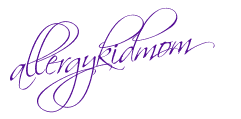I have found a way to make it a little easier on myself and maybe for others who read this too.
- Prepare food for them to eat. I find this option very useful. When you do this, you don't have to worry about what the babysitter will have to feed them. You know that whatever goes in their mouth is going to be food allergy free.
- Babysitter should watch what they eat. If they are not in a food allergy friendly home, the babysitter needs to be careful what they ingest also. If the child is allergic to nuts and the babysitter eats peanut butter and has some on their hands when touching the child, it could set off an allergic reaction.
- Inform babysitter to read ALL ingredients. If you don't have time to prepare food , you can let them know what they need to look out for. Make sure they know to look over all the ingredients and make sure they also know what hidden words that are used. This is very important.
- Allergy Bracelet. If your child has a bracelet, it usually has the foods that they are allergic to listed on it. You can let them know if they forget, they can look at the bracelet to help them remember. Another good thing about one of these bracelets is that if anything goes wrong, you can call the number on the back for help. Actually, this is with the Medic Alert Bracelets. I'm not sure how the rest of them work.
- Food Allergy Card. These are very helpful to hand out when someone is watching your child and they aren't sure what foods to watch out for. They have them on the Internet to purchase. I made some up myself and handed them out to all my family members. I can't speak for the other cards, but the one I created has her allergens listed from severe all the way to very low. I also listed foods to watch out for/avoid and cross contamination issue.
- Know what symptoms to look for. Knowing the symptoms of an allergic reaction is important for a babysitter. Different symptoms show up with different kids, but they are generally the same. It would be imperative for them to know the ones that your child tends to suffer from. Itchy skin/hives, tingling in the mouth (my daughter tends to say her mouth or her throat feels funny), stomach pains, difficulty breathing, swollen tongue or throat, vomiting, diarrhea, and loss of consciousness. One sign that is not usually listed but happened to my daughter is falling asleep. This could be right before loss of consciousness, so telling them this would be important.
- The EPIPEN or EPIPEN JR. I feel it is very important for the babysitter to know how to use the epipen, just in case something does happen. You should let them know to use the epipen (make sure they know how to use it correctly), then call 911 and follow up by calling you.
Copyright © 2010 Allergykidmom. All rights reserved

This is very helpful information. Even when they are at school age, food allergies can be an issue. Thank you for the post!
ReplyDeleteThe information is very helpful. My children don't have food allergies, but I have a few friends whose children do have food allergies and they would greatly benefit from your blog! Great job!
ReplyDeleteWonderful tips and checklist for both parents and caregivers. Very useful information.
ReplyDeleteThank you. My goal is to help as many people as I can through my experiences.
ReplyDelete